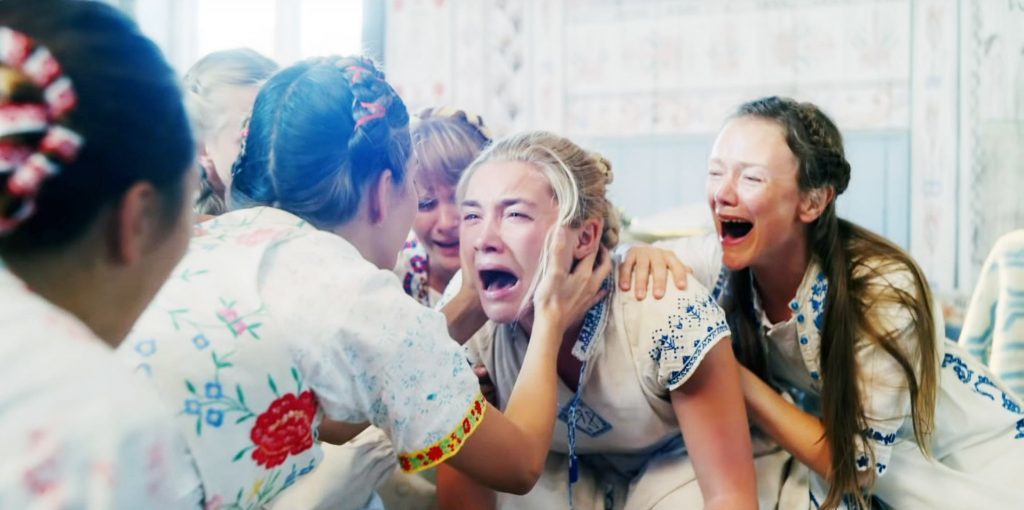
Warning: This review contains mild spoilers
As he demonstrated with his entertaining and unsettling debut, Hereditary, the young director Ari Aster has a knack for combining indie-film-style domestic drama with over-the-top horror. In Hereditary, he was examining a dysfunctional family grappling with mental illness and grief (and demon worship!). In Midsommar, he’s exploring an archetype many women know all too well: the mediocre boyfriend.
This one starts with a kind of psychological horror out of the gate. Our heroine, Dani (a riveting Florence Pugh), has suffered a horrific, unthinkable loss and tries to turn to her diffident grad school beau, Christian (Jack Reynor) for support. He’s there for her about as little as he can be—basically, just enough so he can sleep at night. He’s planning on taking a trip to Sweden with his boys, but he “accidentally” forgets to tell her. Then, out of guilt, he invites her to tag along, half hoping she’ll say no. (She says yes.)
The trip is to visit the commune where the affable Swedish grad student Pelle (Vilhelm Blomgren) has grown up. Anthropology student Josh (William Jackson Harper) wants to write about the ritualistic “Midsommar” festival practiced by this clan for his thesis. Christian hopes to at least get some his inspiration for his own idling thesis. And the cheerfully obnoxious Mark (a very funny Will Poulter) just wants to meet chicks. “Why are Swedish women so hot?” he wonders out loud. Pelle explains that the Vikings commandeered all the beautiful women for themselves. (I have not fact-checked this tidbit.)
This setup is positively brilliant. We already worry for Dani—is she mentally stable enough to go on this trip? Will Christian be there for her if she falls? Throw is the uncanny strangeness of this remote commune and the fact that the traveling crew is offered hallucinogenic mushrooms immediately upon arrival, and we are completely shook.
At first, the commune seems harmless, utopian even. The members all dress in white and refer to each other as brother and sister. They wear crowns of flowers and dance and let out joyful yawps. But there are warning signs—a forbidden barn, a caged bear that no one talks about, strange hieroglyphics and texts.
Meanwhile, Christian keeps proving himself to be the world’s most “meh” boyfriend—forgetting Dani’s birthday, ignoring her when she expresses anxiety, and eventually, much worse.
And then, of course, our nagging suspicions about the commune begin to come true. I won’t reveal them here, but shit gets bad. Interestingly, the film toys with the idea that the commune’s practices, no matter how anathema to our own Western values they may be, should be respected. After all, there is a mutual agreement to participate in these rituals. It’s this line of thinking that keeps the gang from fleeing immediately. (Is the film poking fun at “woke” millennials who want to be openminded above all else?). It doesn’t help that Christian has also decided to write his thesis on the midsummer ritual—much to Josh’s consternation—and he knows the stranger things get, the more explosive his thesis will become.
Like Hereditary, Midsommar goes a bit off the rails in the third act. It never seems chaotic or unplanned—I’m pretty sure Aster, who also wrote the script, mapped it out meticulously—I just happen to prefer creeping dread to all-out mayhem. Also, if I may nitpick, some of the special effects seemed a little . . . arts-and-crafty. Still, Midsommar is a bold, highly original, deeply disturbing, and utterly ingenious work of entertainment. Go see it. And by all means, bring your disappointing boyfriend.
